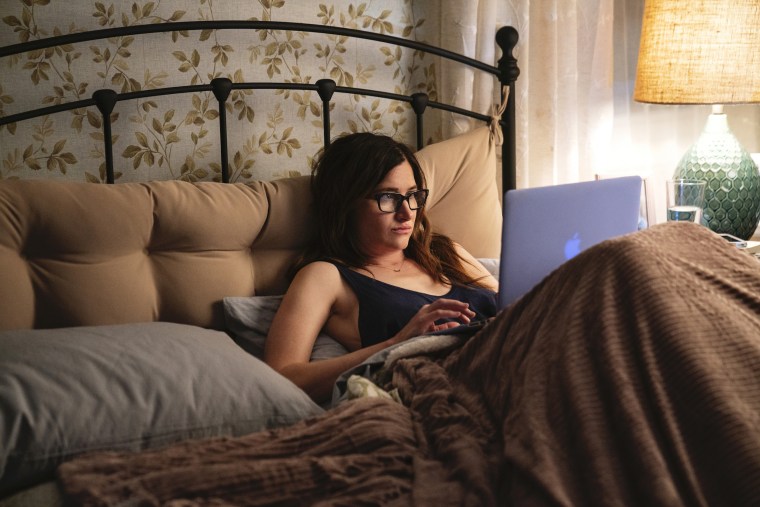"Mrs. Fletcher" is a sweet television comedy about how television, sex and life are all an exercise in failed payoff. For binge watchers, the series makes clear, frustration is its own fetish.
The seven-episode HBO series features Kathryn Hahn as Eve Fletcher, a small-town senior center administrator and single mom whose son, Brendan (Jackson White), has just left for college. Now alone, Eve tries to fill her days by taking a personal essay writing class — and, somewhat to her own dismay, by watching a lot of porn. She also tentatively starts to explore her attraction to Brendan's former classmate, Julian (Owen Teague), and to her co-worker Amanda (Katie Kershaw.)
"Mrs. Fletcher" is a sweet television comedy about how television, sex and life are all an exercise in failed payoff.
"Mrs. Fletcher" is based on a novel by Tom Perrotta (author of "The Leftovers"), and in outline it mostly follows its source material. Its rhythm, though, is much different. The novel, like Perrotta's other works, is a quiet comedy of manners, which strolls leisurely from perspective to perspective, exposing the desires, histories and self-deceptions of its characters with a gently wielded scalpel. Eve, Brendan, Julian and Amanda are all seen both from their own point of view and from everyone else's, in all their uncertainty, absurdity and confused horniness. It's a book meant to draw you in, rather than to keep you on the edge of your seat.
The television series has different goals, and conflicts are heightened for dramatic tension. When Eve has to expel a senior experiencing dementia, for example, the man's son in the book is sad and beaten down. In the show, he's confrontational and belligerent.
Even more striking, though is the way that the show handles sexual release, or the lack thereof. Over and over, the show teases sexual tension, fantasy and consummation, only to thwart them. Eve's internet porn sessions all end with her recoiling from the screen in mingled horror and disgust at where her own fantasies have taken her. Her sexual daydreams are abortive, frustrating interlopers in her workaday life, narrative interruptions that end up interrupting themselves. Dates end before they begin as she neurotically rushes off to check whether she's left something on the stove. Hookups end similarly prematurely.
As with Eve, so with her son. Brandon hoped his college experience would be all parties and casual sex, but he continually finds himself blocked and frustrated. Other character's romantic and personal plotlines also stutter or pratfall. The show is one long exercise in narrative coitus interruptus.
These interruptions are indicative of Eve's personal predicament, as she contemplates her empty nest and tries to figure out where her life goes now. But they're also the standard plot gimmicks of television, which have been accentuated as serialized television became the default critical standard. Our peak TV moment is an endless collection of arcs that promise ecstatic narrative pay-off, only to be cut off, diverted and haltingly restarted. "The Good Place" reboots its entire universe every few episodes, seeking cosmic truths that always end as failed experiments. "Game of Thrones" marched through season after season of escalating switchbacks and master-plots, only to stagger to an end that disappointed nearly everyone and left some fans calling for a do-over.
More consciously than most of its peers, "Mrs. Fletcher," embraces its awkward inadequacy. Its middle-aged protagonist finds in television the perfect medium to express the steady trundle-clunk of time. You grasp for consummation, remember you've left your oven on, and have to wait till next episode to turn it off.
More consciously than most of its peers, "Mrs. Fletcher," embraces its awkward inadequacy.
In her classic 1982 study "Loving With a Vengeance: Mass Produced Fantasies for Women," scholar Tania Modleski argued that the episodic, sporadic form of soap operas paralleled the lives of the housewives who watched it. Viewers snatched glimpses of "Days of Our Lives" or "General Hospital" while performing an ongoing series of open-ended, unsatisfying domestic tasks.
Quality serialized television is still, more or less openly, indebted to the soaps, and part of the pleasure of "Mrs. Fletcher" is the way that it captures the texture of life's incompletions. Leads in romantic comedies mostly remain frozen in their moments of beautiful happiness. Movie action heroes defeat the villain, complete the task and kiss the significant other as triumphant background music plays. But those of us watching “Mrs. Fletcher” get to sit at home and watch as another bid for self-actualization stumbles awkwardly to a temporary halt. We'll have to pick it up tomorrow, or next episode, or next season.
Television narratives can feel contrived and over-extended, with characters racing back and forth for no reason as the showrunners try to pad out the run time. That sense of futility and exasperation is also oddly true to life, though. The world does often seem engineered deliberately to waste your time and thwart your desire for resolution. The satisfaction of "Mrs. Fletcher" is in watching someone fail to experience satisfaction right along with you. Eve knows that the pleasure of peak TV is that you never reach the climax.


